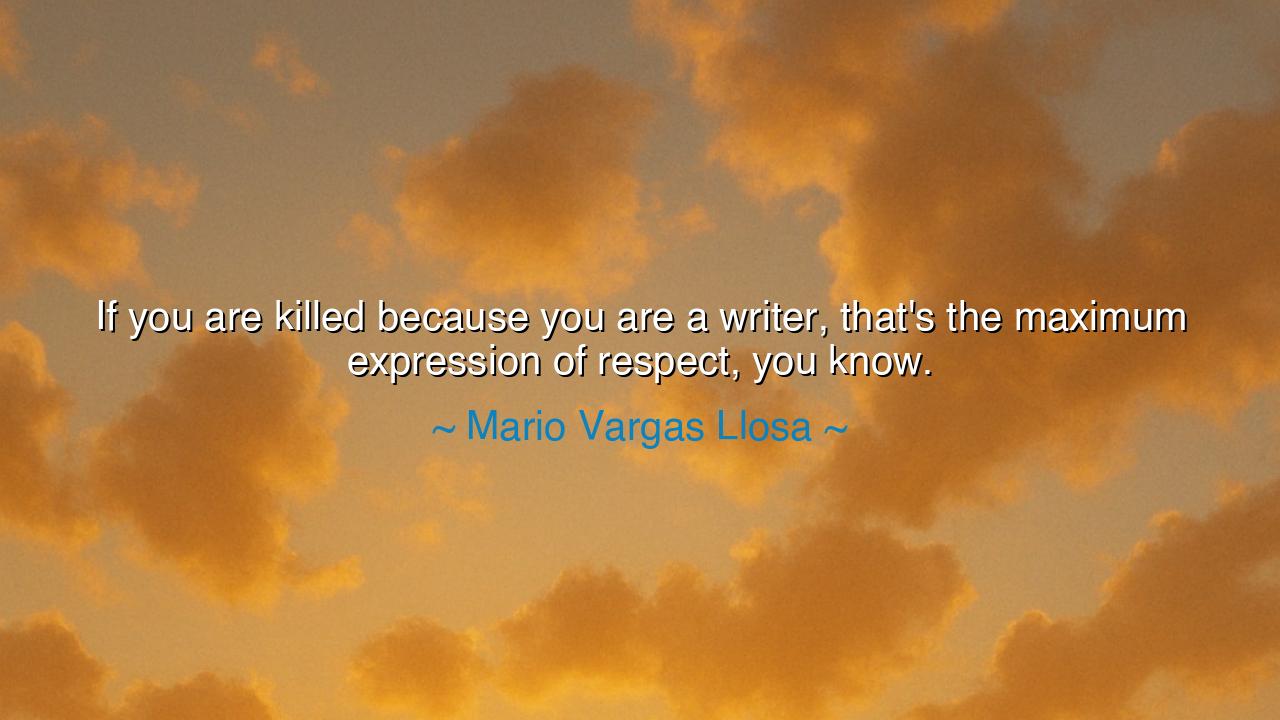
If you are killed because you are a writer, that's the maximum
If you are killed because you are a writer, that's the maximum expression of respect, you know.






The words of Mario Vargas Llosa—“If you are killed because you are a writer, that's the maximum expression of respect, you know.”—are carved with the sharpness of paradox. At first, they seem bitter, almost cruel: how can death be called respect? Yet beneath their surface lies an ancient and eternal truth: that the pen, when it speaks truth to power, is feared as much as any sword. To be silenced by violence is, in a dark way, the acknowledgment that your words carried such force they could not be endured. The tyrant’s bullet, the despot’s chains, the censor’s hand—these are grim testaments that the writer’s voice struck deep.
The deeper meaning is that true writing is not merely ornament or entertainment, but an act of courage, a declaration of truth that unsettles those who cling to lies. The ordinary writer may be ignored; the shallow writer may be tolerated. But the writer who awakens the conscience of a people, who unmasks corruption, who stirs the spirit of freedom—such a writer becomes dangerous to the oppressor. And when such a writer is killed, the act reveals both the weakness of the tyrant and the immortal strength of the word.
The ancients knew this reality well. Socrates, though not a writer in the strict sense, was condemned to death in Athens because his teachings disturbed the comfort of the powerful. His execution was the ultimate sign that his words mattered more than silence, and that truth, though shackled, could not be extinguished. Centuries later, Giordano Bruno was burned for his writings, his vision of an infinite universe too threatening for the authorities of his time. Their deaths stand as grim confirmations of Vargas Llosa’s reflection: to be slain for your words is proof that your words bore unquenchable fire.
History offers still more examples. In our own age, Anna Politkovskaya was murdered for her fearless reporting on war and corruption in Russia. Her pen, though small compared to armies, carried enough weight to provoke fear in those who ruled. In her death, as in others, lies the tragic yet undeniable truth: oppression fears the writer more than the sword, because ideas, once sown, cannot be killed. The death of the writer only scatters their words further, planting seeds in the hearts of countless others.
The emotional power of Vargas Llosa’s words comes from the tension they reveal. To call such a death the “maximum expression of respect” is to acknowledge both the tragedy and the glory. It is tragedy because the writer’s life is cut short; it is glory because their influence has reached its peak, so powerful it could not be left to continue. The oppressor respects not in love, but in fear. And in that fear lies the unspoken confession: “This voice is stronger than we can bear.”
The lesson for us is clear: words have power, and power carries risk. To write truthfully, to speak with courage, is to walk a path where danger may lie. Yet to refuse to write, to silence oneself out of fear, is to betray both truth and posterity. Practically, this means that we must support the voices of the courageous, protect those who write under threat, and honor those whose words cost them their lives. It also means we must be willing, in our own ways, to speak truth even when it is unwelcome.
Thus, Vargas Llosa’s words endure as both warning and inspiration. If a writer’s death is respect, then their life is a battle. Let us not shrink from this truth, but embrace it with reverence. Let us remember that every banned book, every silenced journalist, every slain poet is not a sign of defeat, but of the victory of words over fear. And let future generations know: the writer who dies for truth is not destroyed, but immortalized—for their blood writes upon history a script no tyrant can erase.






AAdministratorAdministrator
Welcome, honored guests. Please leave a comment, we will respond soon